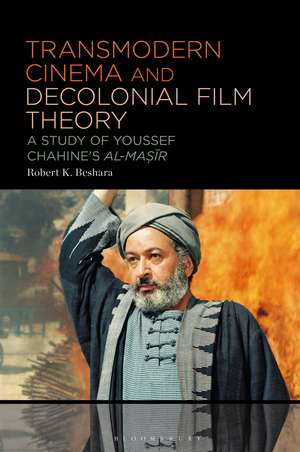Transmodern Cinema and Decolonial Film Theory: A Study of Youssef Chahine's al-Masir
Autor Assistant Professor Robert K. Besharaen Limba Engleză Hardback – mai 2024
Preț: 538.09 lei
Preț vechi: 730.29 lei
-26% Nou
Puncte Express: 807
Preț estimativ în valută:
102.96€ • 107.29$ • 85.25£
102.96€ • 107.29$ • 85.25£
Carte tipărită la comandă
Livrare economică 03-17 aprilie
Preluare comenzi: 021 569.72.76
Specificații
ISBN-13: 9781501385117
ISBN-10: 1501385119
Pagini: 192
Dimensiuni: 152 x 229 mm
Greutate: 0.42 kg
Editura: Bloomsbury Publishing
Colecția Bloomsbury Academic
Locul publicării:New York, United States
ISBN-10: 1501385119
Pagini: 192
Dimensiuni: 152 x 229 mm
Greutate: 0.42 kg
Editura: Bloomsbury Publishing
Colecția Bloomsbury Academic
Locul publicării:New York, United States
Caracteristici
Analyzes Youssef Chahine's (1997) film Al-Masir using decolonial film theory and explores his relevance as a filmmaker in a variety of cinematic contexts: Egypt, the Arab world, Africa, Euro-America
Notă biografică
Robert K. Beshara is Associate Professor and Chair of Arts & Human Sciences at Northern New Mexico College, USA. He is the author of Decolonial Psychoanalysis: Towards Critical Islamophobia Studies (2019) and Freud and Said: Contrapuntal Psychoanalysis as Liberation Praxis (2021). He is also the editor of A Critical Introduction to Psychology (2019) and Critical Psychology Praxis: Psychosocial Non-Alignment to Modernity/Coloniality (2021), as well as the translator of Mourad Wahba's (1995) Fundamentalism and Secularization (Bloomsbury, 2022). Beshara is the founder of the Critical Psychology website: www.criticalpsychology.org.
Cuprins
Acknowledgments Introduction1. Decolonial Film Theory2. Ibn Rushd (1126 - 1198)3. Youssef Chahine (1926 - 2008)4. The Decoloniality of Poetics: al-Ma?ir (1997)Conclusion. The Future of Decolonial Film TheoryFurther Reading on Youssef ChahineYoussef Chahine's FilmographyReferences Index
Recenzii
Robert K. Beshara's compelling endeavor to "sketch the contours" of decolonial film theory is both captivating and profound. Through skillfully unpacking key concepts of postcolonial theory, modernity, coloniality, and decoloniality, his film theory is positioned as a radical aesthetic project navigating the delicate balance between the negation of oppression and the affirmation of liberation. Beshara enacts this through the thought-provoking selection of Egyptian cinematic icon Youssef Chahine and his 1997 film, al-Masir, portraying philosopher Ibn Rushd. The resulting book impressively renders a constellation of transhistorical and transmodern historiographies, ideas, and creative methodologies, offering an invaluable perspective for contemporary practices of critical scholars, artists, and activists.
Seldom have I seen decolonial theory applied across disciplines with such lucidity. Robert K. Beshara brings personal passion and intellectual commitment not only to a film, its maker and its subject - two of the Arab world's more compelling figures, respectively the 20th-century filmmaker Youssef Chahine and the 12th-century philosopher Ibn Rushd - but also to a worldwide vision and political program. Outside the labyrinths of politics, with erudition and alacrity, he manages to undertake genuinely revolutionary work. Suddenly the veil of Orientalist hierarchy and Eurocentric hegemony is torn to reveal an infinitely more engaging world.
Seldom have I seen decolonial theory applied across disciplines with such lucidity. Robert K. Beshara brings personal passion and intellectual commitment not only to a film, its maker and its subject - two of the Arab world's more compelling figures, respectively the 20th-century filmmaker Youssef Chahine and the 12th-century philosopher Ibn Rushd - but also to a worldwide vision and political program. Outside the labyrinths of politics, with erudition and alacrity, he manages to undertake genuinely revolutionary work. Suddenly the veil of Orientalist hierarchy and Eurocentric hegemony is torn to reveal an infinitely more engaging world.
